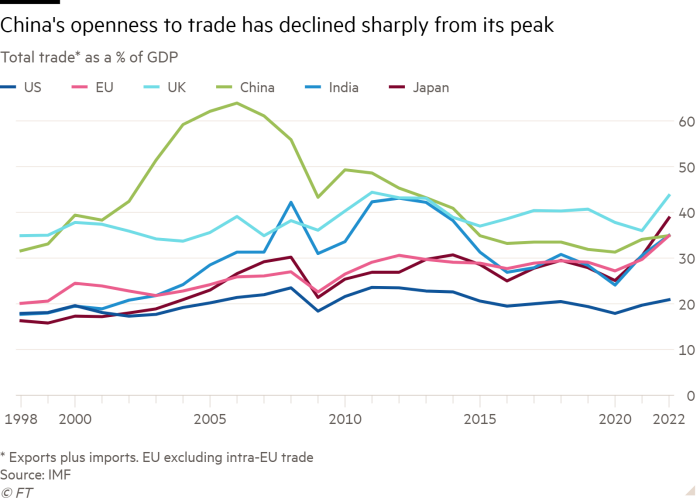Three recent columns asked whether China’s rapid rise in relative gross domestic product and GDP per head was coming to an end, as many believe (or hope). The first argued that China had the potential for rapid growth because it was still so poor: according to the IMF, China’s GDP per head was only 76th in the world in 2022. The second considered the biggest domestic economic problem — chronic excess savings absorbed in an unsustainable debt-fuelled real estate boom that is coming to an end. The third considered the constraints imposed by a falling population. The conclusion was that these were serious, but manageable, difficulties.
This leaves us with the biggest constraint of all, which is politics. Abroad, China needs to navigate around the rising hostility of the US and its allies. At home, it needs to manage the shift to a more balanced economy and sustain the relationship between the communist state and the capitalist economy. These challenges are the most difficult the rising giant faces. If it fails to manage them, it could, at worst, end up in conflict with the high-income democracies and, at best, be another country caught in the “middle-income trap”.
It is hard to assess how significant a constraint on growth the deteriorating external environment will prove to be. This is partly because we do not know how much worse it might get. It is also because some of what might happen is not the result of any specific policy choices by the US or other governments, but rather of a more general anxiety in foreign businesses over the various risks that exposure to China could entail.
The trade policy actions introduced under Donald Trump and continued under Joe Biden have had no significant effect on China’s overall trade. In 2022, it ran substantial trade surpluses with every big economic region, including North America. Its ratio of trade to GDP has fallen, but is still high for such a large economy. Its share of world exports has stopped rising. But it is still far higher than those of the EU (excluding internal trade) or the US. Lack of export earnings will not stop China from buying what it needs.

Most suppliers will also be happy to sell to it. The obvious exception is due to US restrictions on exports of semiconductors and the capacity to make them. According to Tilly Zhang of Gavekal: “China’s semiconductor industry is coming to terms with an unpleasant reality: at this point, co-ordinated sanctions by the US and its allies have effectively blocked its path to making advanced chips.” But more broadly, suggests Thomas Gatley, also of Gavekal, the “main impact of the trade and technology war and its associated tariffs and controls has not been to cut US dependence on Chinese goods, but to make supply chains more intricate and opaque”.
The big question then is whether restrictions on technology will prove a binding constraint on the performance of the economy. I do not know, but I am sceptical. Chinese people are very innovative and entrepreneurial. The big issue is whether these qualities are allowed to flourish. Is it possible for “capitalist communism” to survive politically and flourish economically, or will what Marxists might call its “contradictions” tear it apart? Indeed, are they tearing it apart now, under Xi Jinping’s rule?

Deng Xiaoping was a pragmatic (and ruthless) genius. He allowed the Chinese economy to become open, dynamic and remarkably free. Not hankering for day-to-day control, he was happy to delegate power to competent people. But, since there could be no constraints on the discretion of the party-state, getting things done depended on deals between officials and business. That led to a great deal of corruption. Xi has told us so. World Bank governance indicators show he was right. China is indeed corrupt by the standards of high-income democracies.
Xi is also no delegator. He is instead cementing his power in the party and the party’s power in the country. Meanwhile (and appropriately), objectives and constraints have become more complex. It is impossible to focus only on growth. National security, the environment and inequality also matter, to name a few issues. All this makes policymaking far more difficult. Not least, there are also sudden shocks, notably Covid, where a successful policy of suppression lasted far too long.
This last, suggests Adam Posen of the Peterson Institute for International Economics, ended the “no politics, no problem” bargain, in which the economy functioned freely so long as people stayed out of politics. Today, however, policy has become less predictable and more intrusive. Yet this is not the product of Xi’s whims alone. The issue is far deeper. In the end, the party’s marriage to a market economy risks undermining both its legitimacy and its control. Xi’s desire to restore both inevitably undermines Deng’s great achievement, which is China’s economic dynamism. All this has become even more problematic, now that the external environment is so challenging and the economy so much in need of rebalancing and reform.
The biggest questions about China’s economic future then are political. How will its relationship with the US and its own governance evolve? A big domestic question is whether there is the will and capacity to shift the economy away from its dependence on excessive and wasteful investment towards higher consumption and better investment. The still greater question is whether China has passed the point at which the relationship between the Communist party and capitalism works. If not, which ends up on top? If, as seems probable, it is the centralised party under the direction of one man, can the market economy thrive?
Follow Martin Wolf with myFT and on X (formerly Twitter)

